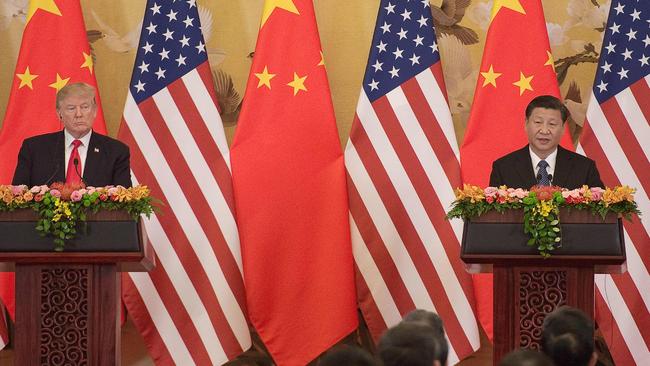‘Technology war’ the next big threat
Battle lines are being drawn between Chinese tech suppliers on one side and companies in the US-led West on the other.

While the world is focused on the impact of the trade war between the US and China, there is a more fundamental tectonic crack emerging, now dubbed “technology wars”, and it is creating major concerns for global business.
Increasing unease by the US and its broader Western orbit, including Australia, about “security issues” is effectively seeing battle lines being drawn between Chinese technology suppliers on the one side and companies operating in the US-led Western sphere on the other.
Decisions like the one made by the Turnbull government to ban Chinese telecoms giant Huawei from supplying 5G technology in Australia, which is already having a knock-on effect on companies such as Optus, Vodafone and TPG (not to mention Huawei’s other business contacts in Australia), are now being made around the world.
Putting security issues to one side, it means that Australia may get a 5G network rollout that is far less cost-efficient — and potentially not quite as cutting edge — as it would have had if Huawei had been able to supply the market.
China is investing heavily in 5G and other technologies, including artificial intelligence, which will put many of its suppliers at the forefront of technology, while at the same time the US and other Western governments are deeming some Chinese tech suppliers off limits because of the potential influence by the Communist government in Beijing.
The US has been limiting the role of Huawei and telecoms equipment maker ZTE for “security reasons”, while some US senators are now urging Canada to ban Huawei from participating in its 5G network.
At the same time, the Trump administration is telling US manufacturers of nuclear power-related technology that it is going to start restricting sales to China’s growing nuclear power industry as it fears that it could give Beijing advantages economically and possibly militarily.
China’s sophisticated internet firewalls, in place for a long time now, have already created a technological dividing line between the country and most of the rest of the world.
But the technology divide is set to get wider, deeper and with more serious implications.
Speaking to The Australian on the sidelines of the ANZ Finance and Technology Forum in Singapore last week, US political scientist Ian Bremmer, the president of political risk firm Eurasia Group, said it was increasingly likely that the world would see two different technology systems in future — one dominated by the US and another by China.
“Over the next 10 years, it is plausible we will end up with a fragmented technology system — with two internets, one American and one Chinese, two systems of big data,” he said. “Countries will have to choose which systems they want to be on.”
Australia, Bremmer said, was in a position where it could have strong economic ties with China and strong military ties with the US and was not in a position where it had to “choose” which side it was on.
But he warned that if Australia were forced to “choose” on technology, which it was already doing with the Huawei decision, it would most likely opt for a US/Western-led technology system that would have implications for its broader trading ties with China.
“This will probably have negative implications for a lot of your other industries doing business with China,” he said.
“Right now, Australia has a great security relationship with the US and a great economic relationship with China.
“But it is not clear, in 10 years’ time, if the US versus China is going to be a big technology play, that Australia is going to be able to do the same. If there is a technology war between the Americans and the Chinese, countries like Australia have to choose. And that is really dangerous.
“If your countries are fundamentally fighting in technology, then probably the Chinese are going to be more interested in sending their tourists to other places.”
ANZ’s head of international banking, Farhan Faruqui, reinforced the point, telling The Australian that global companies were now more worried about the impact of a “technology war” and how that would affect their business than they were about the trade wars.
He said increasing government involvement in business transactions for security reasons, particularly around technology, was becoming an issue for companies as they tried to make long-term investment plans.
While not debating the politics, he warned that the world was in a situation where there were increasing barriers to technology transfer, and it was only going to get worse.
“The barriers will come up that will create delays in the transfer of technology,” Faruqui said. “It will severely disrupt supply chains in the technology space and create a slowdown in growth.”
It is up to each government to make decisions in the best interests of its citizens but US-China tensions are set to create a much bigger technological divide, which business, with its need to make long-term investment decisions, will need to grapple with.
Glenda Korporaal attended the ANZ Finance and Treasury Forum as a guest of ANZ.




To join the conversation, please log in. Don't have an account? Register
Join the conversation, you are commenting as Logout